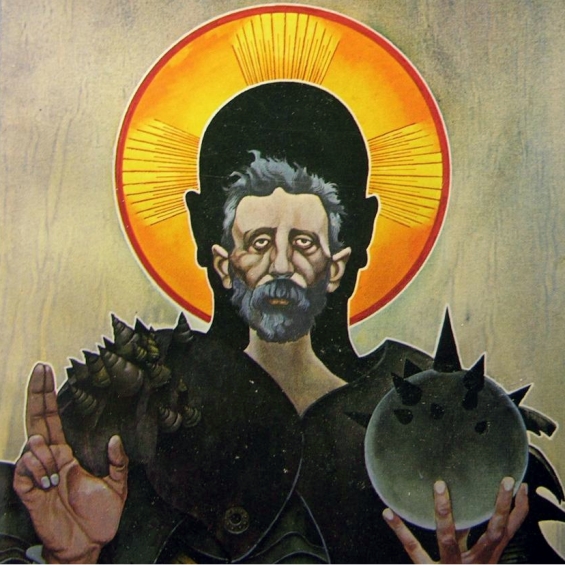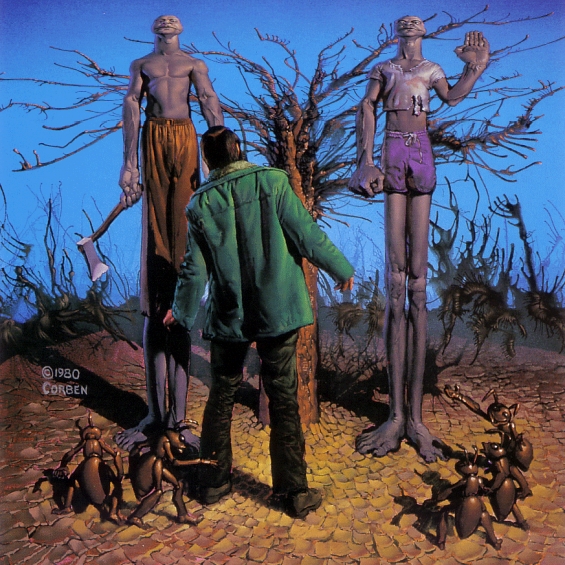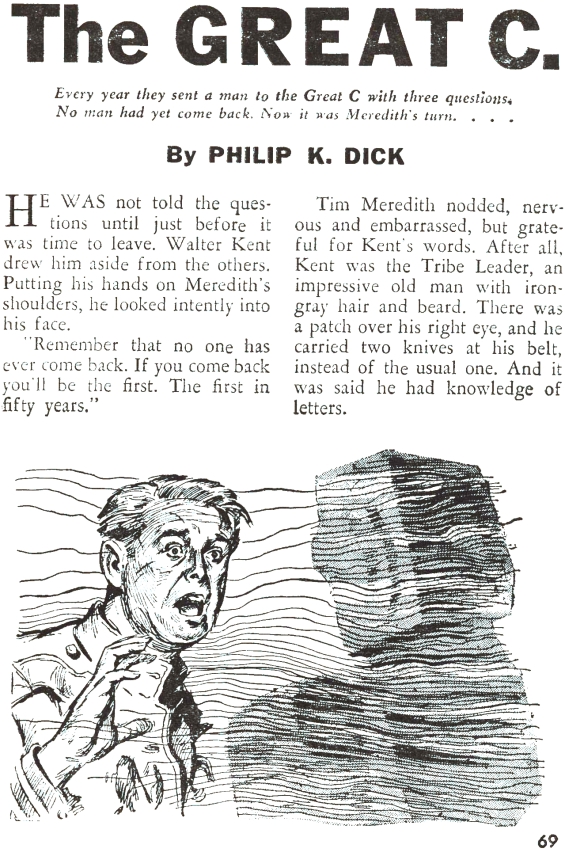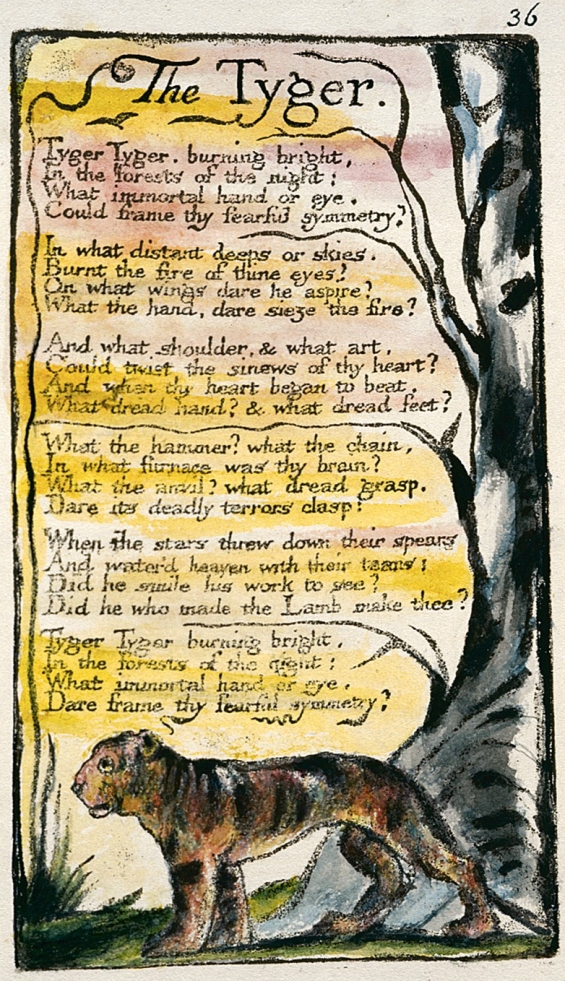
 The SFFaudio Podcast #402 – Jesse, Paul Weimer, and Marissa, talk about A Maze Of Death by Philip K. Dick
The SFFaudio Podcast #402 – Jesse, Paul Weimer, and Marissa, talk about A Maze Of Death by Philip K. Dick
Talked about on today’s show:
1970, one of Marissa’s favourites, get going, where is he going with this?, ohhhkay, Do Androids and Ubik, Morbid Chicken, similar scenes, the space jalopy scenes, this guy is crazy, the Philip K. Dick fans page, Kim Stanley Robinson’s Conspiracy ’87: “…Robinson came up with some refreshingly intriguing ideas. For instance, he sees Dick in A MAZE OF DEATH, deliberately murdering the cast of characters he has used in his books, and grown sick of since SOLAR LOTTERY. There is a different, new cast after MAZE”, the bevatron, various realities, dying one by one, hating each other for their worlds, that house!, all the religions in a blender, a signpost, The Cosmic Puppets, this far and no farther, endlessly spinning wheels about what God is like, prayer transmissions, the Walker On Earth, Seth has ascended, virtual reality, dolphin people, Kurt Vonnegut wrote that book: Galapagos, cynical, he’s going to bite his tongue off, sea-lion people, Margaret Atwood, Oryx And Crake, an episode: Books Jesse Hates, recycled or re-themed, the tench things: T.E.N.C.H. = tensions, tension apprehension and dissension have begun, Alfred Bester, I can’t stand you ANYMORE!, so depressing, stuck in a bottle forever, a Hell, Seth Morley escapes Hell, suicide, “oh god, that’s life!”, and then we play videogames and read books, Faith Of Our Fathers, which is the reality, overlapping possibilities, the weird gnostic twist, purposely plunging into fake reality, a metaphor, drug addiction, Seth Morely’s apotheosis, Delmak-O, is it too soon to bring up The Matrix?, the machines tried to give humans paradise, you weren’t satisfied with it, acting out, it’s a “dead star” not a “black hole”, right to the edge, it literally would be hell, Event Horizon, frozen forever, the Disney movie The Black Hole (1979), they wished they had had star wars, an R2-D2 character, Maximilian, see the movie anyway, a really fun kid’s movie, Roddy McDowell, Anthony Perkins, the overture, Virtuality, a murder happens, a Civil War world, a holodeck, musician/superhero, sounds Philip K. Dicky, follow me down the rabbit hole, Paul’s guess, “Heading for a lawsuit…”, “ripped off from Joe Haldeman’s SF novel “Old Twentieth”, Frozen Journey by Philip K. Dick (1980), you are in a faulty cryonic suspension, Vanilla Sky, Abres Los Ojos, in Philip K. Dick’s Exegesis, the Walker On Earth as the protagonist, I don’t trust Philip K. Dick, interpretations, we’re all the Walker On Earth, they’re all Dick, I have to sleep with all the men, he really loves women, unrealized motivations, group therapy, couples therapy, so impressionable, empathizing with everybody’s point of view, he’s working out his own psychology, seeing one person’s attempt to reconcile all the weirdness that’s in his mind, H.P. Lovecraft, that’s his psychology, always being honest, this is what fascinates and obsesses them, PKD doesn’t like it either, “this is life we’re all sort of trapped in orbit around a dead star”, “why the fuck did you do that, you asshole?”, we’re so annoying, escaping to heaven, Heaven would be the most boring fucking place in the entire universe, change, coming to appreciate it, they’re all blurring together, The Game-Players Of Titan, haning out with people who are annoyed with each other, Philip K. Dick’s Agatha Christie novel, Ten Little Indians, Murder On The Orient Express, wow I had no idea this was coming!, “click here for a big spoiler”, too dense or too sick, did you realize what was going on beforehand?, Paul started to suspect, is this an Eye In The Sky sort of thing?, red herrings, a government experiment, an oceanologist and no ocean, an economist, their concentrating all the idiots together, a bunch of people with degrees they couldn’t use, a noser, a squib, a punishment planet, I don’t think Philip K. dick knows what’s going to happen, take me to my last destination, this has Printers in it, a hint early on where the conversations repeat, 1977, kind of like this podcast, it’s long and everybody’s babbling away, just like the podcast, you’re thrown a little bit, what is going on?, an author’s forward,
AUTHOR’S FOREWORD
The theology in this novel is not an analog of any known religion. It stems from an attempt made by William Sarill and myself to develop an abstract, logical system of religious thought, based on the arbitrary postulate that God exists. I should say, too, that the late Bishop James A. Pike, in discussions with me, brought forth a wealth of theological material for my inspection, none of which I was previously acquainted with.
In the novel, Maggie Walsh’s experiences after death are based on an L.S.D. experience of my own. In exact detail.
The approach in this novel is highly subjective; by that I mean that at any given time, reality is seen–not directly– but indirectly, i.e., through the mind of one of the characters. This viewpoint mind differs from section to section, although most of the events are seen through Seth Morley’s psyche.
All material concerning Wotan and the death of the gods is based on Richard Wagner’s version of Der Ring des Nibelungen, rather than on the original body of myths.
Answers to questions put to the tench were derived from the I Ching, the Chinese Book of Changes.
“Tekel upharsin” is Aramaic for, “He has weighed and now they divide.” Aramaic was the tongue that Christ spoke. There should be more like him.
what the hell does this mean?, it’s the Gotterdammerung!, this lady’s an embodiment of Freya, that guy’s an embodiment of Thor, archetypes of Biblical characters, the table of contents:
1 In which Ben Tallchief wins a pet rabbit in a raffle.
2 Seth Morley finds out that his landlord has repaired that which symbolizes all Morley believes in.
3 A group of friends gather together, and Sue Smart recovers her faculties.
4 Mary Morley discovers that she is pregnant, with unforeseen results.
5 The chaos of Dr. Babble’s fiscal life becomes too much for him.
6 For the first time Ignatz Thugg is up against a force beyond his capacity.
7 Out of his many investments Seth Morley realizes only a disappointing gain– measured in pennies.
8 Glen Belsnor ignores the warnings of his parents and embarks on a bold sea adventure.
9 We find Tony Dunkelwelt worrying over one of mankind’s most ancient problems.
10 Wade Frazer learns that those whose advice he most trusted have turned against him.
11 The rabbit which Ben Tallchief won develops the mange.
12 Roberta Rockingham’s spinster aunt pays her a visit.
13 In an unfamiliar train station Betty Jo Berm loses a precious piece of luggage.
14 Ned Russell goes broke.
15 Embittered, Tony Dunkelwelt leaves school and returns to the town in which he was born.
16 After the doctor examines her X-rays, Maggie Walsh knows that her condition is incurable.
maybe all this stuff did happen!, other realities, the economist goes broke, that’as another Philip K. Dick novel: The Cosmic Puppets, true in a metaphorical way, he’s playing a game, Jesse unearths a mysterious object, Rupert, stories told in four levels, “In Which Rupert Finds A Lost Boy” rhyming couplets, prose text, leveling of reading, on one level it’s a murder mystery (and science fiction novel), if you play long enough with Philip K. Dick…, a long game, not the book to start with, late Dick but not bad at all, the comedy and the descriptions and atmosphere of the planet, more polished, Three Stigmata, communities of protagonist, reading about a bunch of dickheads, he’s kind of an asshole sometimes, stressing each other out, the original title: The Hour Of The Tench, the manuscript, no revision, no moving things around, no third and fourth drafts, getting it right the first time, knowing how to hit the beats, Lawrence Block, Donald Westlake, how well the topic can be played out, a cute topic won’t be a great novel, as he was going it developed into that and started playing it up, How I Rose From The Dead And So Can You, forty god-worlds, mot-scientific means, a big clue, a biblical number, rather than revise, interplaneast and interplanwest, Dick loves Germany, Waking Life, are you the story?, he’s living the books, why is he always obsessed with printers?, their all in an insane asylum, One Flew Over The Cuckoos Nest, little cups with pills, where do the pills come from?, when they don’t work properly and make me feel weird, buy a new car and suddenly entropy happens, the fight against entropy, the Printers are cool because…, other writers or Star Trek deal with replication, what will that do to the economy, a post scarcity future, anti-entropy machine: DNA, I make a kid and he’s not a little mini-me, even this awesome amazing thing that is life even it can’t win, every printer we’ve ever met in any story has been a dying printer, like fairies they’re always dying, deep and creepy, the computer is the Bible, the Bible as our programming, everything is decaying but not the ink, he’s taking it from another Bible: the I, Ching, Jesse’s understanding of how church works, throwing the yarrow stalks, don’t do two shows in the row exactly the same, a good fruitful passage, that’s the mystery of God!, Kings 2:4, it’s no John 3:16, Paul the altar boy, that’s the way its going to be, Jesse’s 4am dream, saving the end for the morning of, in a diner in Orange County, living in a Philip K. Dick (played by Antonio Banderas), a 1950s everyone has a special uniform world, cafe/restaurant/bookstore, a bag with two copies of A Maze Of Death, I’m pretty sure the last two chapters are going to reveal something to me, Antonio Banderas Philip K. Dick sort of smiled, just like in Delmak-O, that was only way this book could be adapted, what’s wrong with Philip K. Dick movie adaptations…, there’s no music swelling, A Scanner Darkly, successful, Blade Runner, Total Recall, Philip K. Dick can never be faithfully adapted, Adaptation, it made sense in the dream, a theory as to what’s going on in the book, that’s essentially what the dream is, an internet of dreams, the collective bevatron worlds of this dream, isolated invented worlds, a hall of puppets, Mormonism, experimenting with religions, Roger Zelazny’s Amber, Tickleufarsen, the Walker On Earth is real, he wants to believe in Jesus, stuck on the side of the highway with a flat tire (and helped by Jesus), Jesus Christ is a character (like Batman), Constantine and Council of Nicea, why religious revolutions happen, this Jesus Robin Hood figure, how is Donald Trump gonna go to heaven?, PKD is the Walker On Earth for the characters in A Maze Of Death, inviting a meta-interpretation, a philosopher who uses 1950 and 1960 paperbacks to do philosophy, possibility vs. technology, the Printer is the important part, in a peripatetic Socrates and Plato kind of way, that’s why he (Dick) is immortal, Marilyn Monroe can be reconciled, the coffee machines and the computers, Google T.E.N.C.H., that’s what we’re all striving for, the ink stays, the WORD lives on, 1s and 0s, what really happened, he saved them all, ridiculous but also true, the Total Dick-Head Blog, the cook changes, oh yeah I’m the cook, The Commuter by Philip K. Dick, we knew it from the colour of the couch, new knowledge, the game he’s always playing, it’s so subtle, nice catch!, totally re-readable, we did a show.
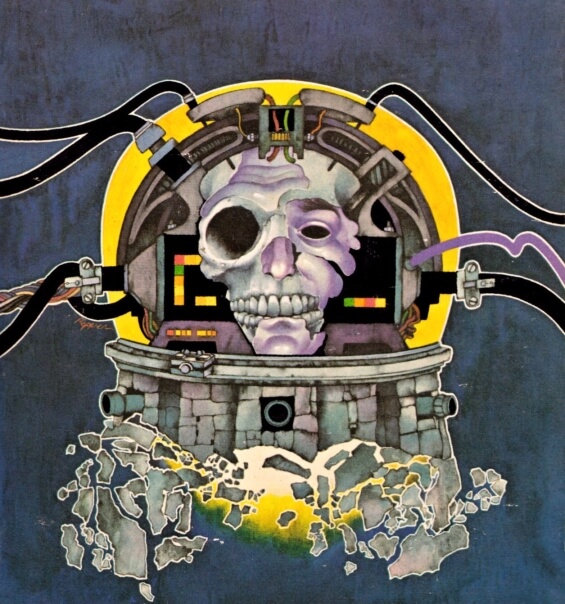
Posted by Jesse Willis




